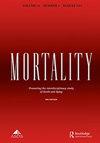尊重、代理和死后愿望
IF 1
0 HUMANITIES, MULTIDISCIPLINARY
引用次数: 0
摘要
死后愿望的规范意义通常被认为是对过去人的规范意义的监督。这一策略的问题在于,对过去民族的规范意义(如果有的话)缺乏共识。在本文中,我回避了这个问题,将死后愿望视为人们做出的一种选择,从而将其规范性意义呈现为监督我们赋予选择(代理)的规范性意义,而不是过去的人的规范性意义。我的论点是,只要一个假想的对话者赋予(至少是他们自己的)代理价值,他们就会被明确地强迫赋予死后愿望规范意义,而不管他们对过去的人的道德地位或死亡本质的信仰如何。然后,我通过在考古实践的背景下展示这一框架的含义来结束本文,以证明这一观点能够产生具有坚实哲学基础的直观的、可操作的指导。本文章由计算机程序翻译,如有差异,请以英文原文为准。
Respect, agency, and posthumous wishes
The normative significance of posthumous wishes is commonly presented as supervening upon the normative significance attributed to past people. The problem with this strategy is the lack of consensus on the normative significance (if any) of past peoples. In this paper, I sidestep this issue by casting posthumous wishes as but a type of choice people make, thereby presenting their normative significance as supervening on the normative significance we attribute to choice-making (agency) and not on the normative significance of past people. It will be my argument that so long as one’s hypothetical interlocutor assigns value to (at least their own) agency, they are categorically compelled to assign normative significance to posthumous wishes, regardless of their beliefs concerning the ethical status of past people or the nature of death. I then conclude the paper by presenting the implications of this framework in the context of archaeological practice to demonstrate this perspective’s capacity to yield intuitive, actionable guidance with firm philosophical foundations.
求助全文
通过发布文献求助,成功后即可免费获取论文全文。
去求助
来源期刊

Mortality
Arts and Humanities-Religious Studies
CiteScore
1.80
自引率
12.50%
发文量
42
期刊介绍:
A foremost international, interdisciplinary journal that has relevance both for academics and professionals concerned with human mortality. Mortality is essential reading for those in the field of death studies and in a range of disciplines, including anthropology, art, classics, history, literature, medicine, music, socio-legal studies, social policy, sociology, philosophy, psychology and religious studies. The journal is also of special interest and relevance for those professionally or voluntarily engaged in the health and caring professions, in bereavement counselling, the funeral industries, and in central and local government.
 求助内容:
求助内容: 应助结果提醒方式:
应助结果提醒方式:


